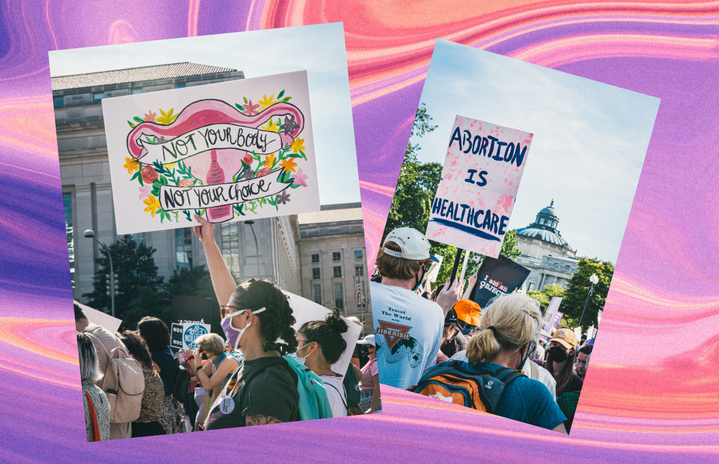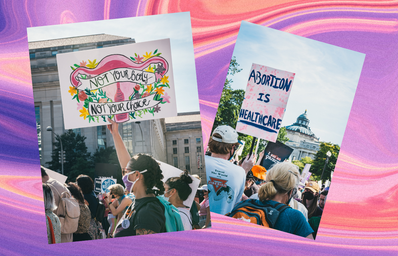On June 24th, the U.S. Supreme Court overturned Roe v. Wade, a nearly 50-year-old decision that protected a pregnant woman’s right to choose to have an abortion. The reversal of the landmark decision has many women concerned about the future of their reproductive rights. The decision is even more disastrous for women of color.
Women of color were initially ignored in the debate over reproductive rights of women. Underground services like Jane’s Collective, an activist-run operation based in Chicago from 1969 to 1973, worked to help women access safe abortion procedures; however, their focus was primarily on white women because the majority of their members were white, middle-class women.
A Black woman named Lois, who planned to get an abortion, confronted and reprimanded the group for their lack of inclusivity and decided to join the collective to counsel Black patients. Eventually, more women of color-centered groups such as In Our Own Voice: National Black Women’s Reproductive Justice Agenda, the National Asian Pacific American Women’s Forum, and the National Latina Institute for Reproductive Health came together to advocate for reproductive freedom.
Despite the rise of these reproductive rights advocacy groups, the reversal of Roe v. Wade will impact the lives of women all over the United States. Still, women of color will be disproportionately affected. Centers for Disease Control and Prevention studied the abortion rates for 30 reporting areas in 2019 (excluding states that did not report, did not report by race/ethnicity, or did not meet reporting standards).
The data concluded the rate for Black women receiving an abortion was the highest, receiving 23.8 per 1,000 women in the same racial/ethnic group. Hispanic women received 11.7 per 1,000 women, the “other” category (this category included Asian and Pacific Islander women, multiple racial identities of women, and other races of women) received 13.0 per 1,000 women and white women received 6.6 per 1,000 women.
Black women also pose a higher risk as they are three times more likely to die from pregnancy-related deaths than white women. The CDC points to factors such as variation in quality healthcare, underlying chronic conditions, structural racism, and implicit bias that may contribute to such disparities.
A Duke University study estimated the mortality rates of women carrying their pregnancies to full term if all abortions were denied. Amanda Jean Stevenson, the researcher conducting this study, applied published pregnancy-related mortality ratios (PRMRs) from 2014-2017 to additional pregnancies carried to term and subtracted the lower mortality risk of the legal induced abortions denied.
The study determined the estimated number of pregnancy-related deaths in each racial/ethnic group during the first year of an abortion ban. The estimated annual number of pregnancy-related deaths would rise from 675 to 724 (49 additional deaths, representing a 7% increase), and then to 815 in subsequent years (140 additional deaths, for a 21 percent increase).
Black women would face a much higher rate of pregnancy-related deaths than any other race, with the results indicating a 12% increase in the first year of an abortion ban and a 33% increase in subsequent years. In the first and subsequent years, Hispanic women’s mortality rates would rise by 6% and 18%, respectively.
More than half of the United States Black population lives in southern states with the most stringent abortion laws. According to USA Today, “More than half of the nation’s Black population lives in the South, where women of color, including Hispanic women, make up a significant proportion. The Plains states also have a large Indigenous population. Days ago, the Oklahoma Legislature passed a six-week abortion ban similar to one adopted by Texas last year”.
Unwanted pregnancies are more common in Black and Hispanic women than in white women. Women of color are also more likely to have Medicaid coverage, with 31% of Black women and 27% of Hispanic women aged 15-44 enrolling in the program in 2015, compared to 16% of white women.
Medicaid is a vital resource for pregnant women, covering 51 percent of all births in the United States. According to a 2017 article by Guttmacher Institute, 57 % of women in the U.S. who are of reproductive age live in areas hostile to abortion rights.
Although 15 states personally cover abortion services for Medicaid enrollees, 7.5 million women in other states do not—51% of whom are women of color. The overturning of Roe v. Wade has the potential to threaten the security of health insurance coverages.
However, many women of color can not even access Medicaid or other reproductive care alternatives. Immigrants make up nearly 35% of the Latinx community and 60% of the Asian-American community, making them ineligible for Medicaid and other vital healthcare programs.
This is due to the Personal Responsibility and Work Opportunity Reconciliation Act of 1996, which requires residing immigrants to wait at least five years before receiving Medicaid or CHIP benefits. A 2021 article by National Asian Pacific American Women’s Forum supports this statistic by showcasing that nearly 17% of Asian, Native Hawaiian, and Pacific Islander women who immigrated to the United States less than five years ago were uninsured as of December 31, 2019.
According to a 2006 article by the Center of American Progress found through national data that 35 percent of Asian/Pacific Islander pregnancies end in abortion, compared to 18 % for white women. Furthermore, the study found that abortion rates fell for all groups except Asian and Pacific Islander women between 1994 and 2000.
Many women of color also can not afford birth control alternatives. With the transition of abortion clinics relocating to more progressive states, women of color often can not travel out of state to receive care.
As the national outcry over this situation increases, many women of color in positions of power have spoken out against the Supreme Court’s decision. Former first lady, Michelle Obama voiced her grievances on Friday, stating “I am heartbroken that we may now be destined to learn the painful lessons of a time before Roe was made law of the land-a time when women risked losing their lives getting illegal abortions. A time when the government denied women control over their reproductive functions, forced them to move forward with pregnancies they didn’t want, and then abandoned them once their babies were born…”.
You can access Michelle Obama’s full statement here.
Representative Judy Chu, the chair of the Congressional Asian Pacific American Caucus (CAPAC), discussed her views on the overturning decision in a statement saying, “This ruling will harm women and families everywhere — with restricted access to abortion disproportionally impacting people of color. Asian American, Native Hawaiian, and Pacific Islander (AANHPI) women already face numerous barriers — including language, economic and legal obstacles — when trying to access healthcare, particularly in regard to contraception and family planning care… It is imperative Congress acts immediately to enshrine Roe and ensure AANHPI communities — and communities all across our nation — can exercise their personal freedom and make decisions alongside health care professionals and their families about their own bodies”.
You can access Rep. Judy Chu’s full statement here.
Alexandria Ocasio-Cortez spoke out during a House meeting over her reaction to the Supreme Court’s decision stating, “We’re here today…today is a very heavy day for so many of us across the country. Every single one of us has woken up today with less rights than we had yesterday and pregnant people, in particular, are in more danger in the United States today than we were yesterday as a result of the Supreme Court’s decision to overturn Roe v. Wade…the same individuals who purport…claim to be protecting life, fight against universal health care. Do they believe in universal child care? Do they believe in life after birth? From their policy positions, I assure you the evidence is lacking…”.
You can watch AOC’s full statement here.
Ocasio-Cortez also tweeted that same day stating, “Overturning Roe and outlawing abortions will never make them go away. It only makes them more dangerous, especially for the poor + marginalized. People will die because of this decision. And we will never stop until abortion rights are restored in the United States of America.”
In the health care system, women of color face racial discrimination and bias and are frequently ignored or mistreated. The overturning of Roe v. Wade may result in the loss of many lives as a result of pregnancy-related complications or even unsafe abortion alternatives.
How did you react to the Supreme Court’s decision to overturn Roe v. Wade? Do you consider the ruling to be justified or a violation of citizens’ rights? Let us know @HerCampusSJSU


